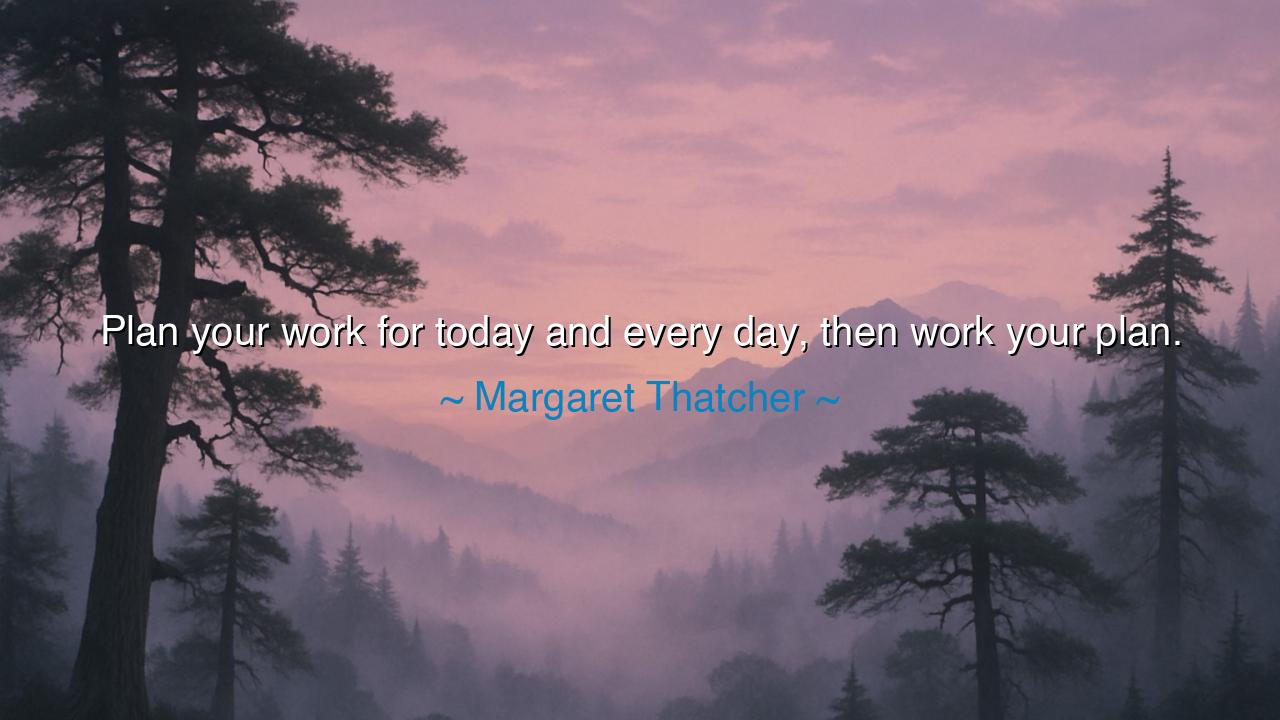
Plan your work for today and every day, then work your plan.






Hear the words of Margaret Thatcher, who spoke with the steel of resolve: “Plan your work for today and every day, then work your plan.” In this saying lies the eternal rhythm of duty and discipline: to think with foresight, and then to act with perseverance. For vision without labor is a dream, and labor without vision is wandering. Together, they become the path to mastery.
She commands first to plan your work, for the wise do not stumble blindly into the day. Just as the architect lays out the foundation before raising the walls, so must each soul order its tasks before striving to complete them. To plan is to tame chaos, to bend the endless flood of time into a stream that can be crossed.
Yet the plan alone is not enough. One must also work your plan, with patience and with courage. Many devise schemes, but few have the discipline to carry them into action. Thatcher reminds us that the union of thought and deed is the true measure of strength. To plan is the mind’s duty; to labor is the body’s offering; but only together do they yield fruit.
Thus, O seekers, learn this: greatness does not come by chance. It is forged in the small victories of each day, in the constancy of one who plans and then fulfills. Every day is a stone, and by laying them one after another with care, the tower of a lifetime is raised.
Therefore, let this wisdom endure: craft thy plan with clarity, then honor it with action. For the day is short, but the harvest of well-ordered labor is long. Thatcher’s words, though born of governance, echo as a timeless law for all who would master their lives. Would you like me to shape this into a proverbial cadence, as though it were inscribed upon tablets of discipline?






QANguyen Thi Quynh Anh
Margaret Thatcher’s quote is a reminder to stay disciplined, but what about days when you’re feeling unmotivated or uninspired? Can the structure of a well-made plan help you push through those tough days, or does it become a source of stress? Sometimes I feel that planning is a double-edged sword—on one hand, it keeps us on track, but on the other, it can make us feel pressured when things aren’t perfect.
TCTu Vo Thi Cam
Thatcher’s quote seems very practical, but it also brings up an interesting question—how much time should we spend planning before we actually start working? Sometimes, I get so caught up in making the perfect plan that I end up procrastinating. How do we find the sweet spot between planning and taking action? Is there a way to keep a plan flexible enough to allow room for creative solutions along the way?
HLHang Libra
I understand the value of planning, but sometimes I wonder if the rigid execution of a plan could lead to burnout. Life isn’t always predictable, and when things don’t go as planned, it’s easy to feel like a failure. Does anyone else feel that way? Is there a balance between planning your work and being kind to yourself when things don’t go according to the plan?
PKngo phu khang
This quote makes me think about how easy it is to get caught up in the day-to-day without a clear plan. However, planning your work every day seems like it could become overwhelming. Does this mean that we need to have every hour scheduled, or is there room for spontaneity? Could the pressure of always working a plan cause stress or reduce creativity in the long run?
HHHai Ha
I agree with Margaret Thatcher's advice, but how do we stay motivated when the plan doesn’t go as expected? What happens when unforeseen circumstances arise and we’re forced to adapt? Is it realistic to expect ourselves to follow a plan rigidly every day, or should we allow some flexibility? It’s definitely a balancing act between planning and adapting to life’s unpredictability.